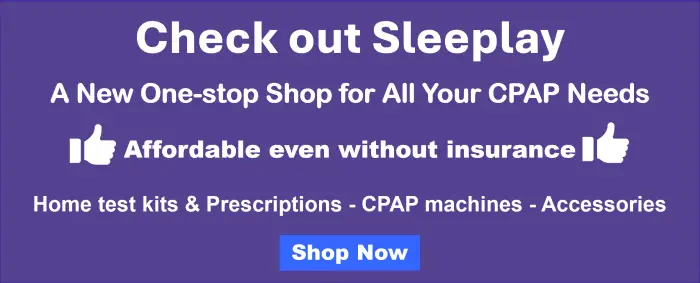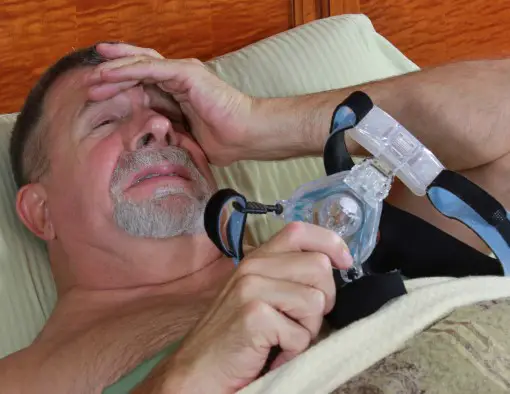
9 Remedies worth a try for CPAP panic attacks
By Jason Wooden, PhD and Kristal McKinney, LICSW, CMHS | April 9, 2021
CPAP panic attacks are common for people just starting treatment. Many find the mask uncomfortable at first and for some it may feel suffocating or claustrophobic.
Your options for managing panic attacks include relaxation exercises, different machine settings, trying a different mask or machine, natural anxiety aids, counseling, medication, life style changes, and alternative sleep apnea treatments.
You’re not the only one dealing with CPAP panic attacks…
You strap on your CPAP mask, fire up your CPAP, and switch the lights off.
As your machine gets up to speed your heart starts racing and your hands start shaking. Suddenly you break out into a cold sweat.
If this sounds familiar, it might have been a CPAP panic attack.
You’re certainly not the only one.
It’s pretty common for people to run into issues with CPAP when first starting therapy. Research shows that many abandon their treatment with in the first year.
Check an online CPAP or sleep apnea forum and you’ll see posts from people struggling to get comfortable with their new setup.
Studies suggest that as many as half of sleep apnea patients either stop using their CPAP machine or never fill their prescription.
That’s a lot of people struggling with CPAP trouble just like you…
Living with sleep apnea is tough enough, but when the treatment seems to be worse, it can leave you feeling hopeless. That’s what makes CPAP panic attacks so frustrating.
So, we understand if CPAP is weirding you out and giving you panic attacks.
However, whether it’s your first time experiencing panic attacks or you’ve had them in the past before starting CPAP, don’t lose hope because the answers are out there.
People may struggle but they’re now plenty of things you can do.
And the truth is the stakes are too high to leave your sleep apnea untreated.
Yes, sleep apnea can disrupt sleep and leave you feeling miserable throughout the day. It can also put you at risk for other serious health issues including high blood pressure, heart disease, stroke, diabetes, depression, or even death.
So, let’s take a look at what’s happening and some practical things that can help with CPAP panic attacks.
What’s up with the CPAP panic attacks?
Before we get into your options, we need to take a look at what’s happening when a CPAP panic attack comes on.
For starters, people with panic attacks generally experience sudden periods of intense fear even when there is no real danger. It may include heart palpitations, sweating, shortness of breath, and a feeling that something bad is going to happen.
And the attacks may last for several minutes or longer.
Panic attack symptoms
- Chest pain
- Chills
- Choking or smothering sensation
- Difficulty breathing
- Fear of losing control
- Feeling like you’re going to die
- Intense feeling of terror
- Nausea
- Racing heart
- Sweating
- Tingling or numbness in fingers or toes
- Trembling or shaking
Source: Anxiety and Depression of Association of America
While the causes are poorly understood, panic attacks are believed to be the result of genetics, thought patterns, stress, unresolved trauma, and other environmental factors.
It’s no surprise CPAP causes panic attacks for some people. We’re just not used to wearing a mask hooked up to a machine. It’s a totally new sleeping experience.
Many find the mask uncomfortable while others complain about the blowing air, system leaks, dry nose, red eye, and nasal congestion. For some, it just feels suffocating or claustrophobic.
Whether it’s your first time or it’s happened to you before you got a CPAP machine, you should know that panic attacks are common for people who are new to CPAP therapy. Also, people who normally suffer panic attacks are more likely to have them while trying to fall asleep or while sleeping.
It’s not just CPAP, poor sleep and sleep apnea also linked to panic attacks
Did you know there are all sorts of connections between panic attacks, sleep, and sleep apnea?
Stress and anxiety are known to make it harder to fall asleep. Not surprisingly, people with panic disorder often have sleep issues since panic attacks can make it harder to fall back to sleep.
Panic attacks have also been linked to sleep apnea.
Some of the symptoms of sleep apnea and panic attacks overlap.
For people with sleep apnea, breathing stops or gets very shallow during sleep. These breathing pauses may occur up to 30 times or more in some individuals and affect the supply of oxygen to the body.
Studies have shown people suffering from sleep apnea are more likely to get panic attacks. Also, when you have a sleep apnea breathing pause, the body releases hormones that cause anxiety and panic to try to get things back on track. Unfortunately, this may also cause a panic attack.
So, your CPAP setup may not be the only cause for your panic attacks. Your poor sleep and sleep apnea may be involved too.
Add a CPAP mask to the mix and you’ve got the makings for a tough night.
9 Remedies worth a try for CPAP panic attacks
Finally, we get to why there’s hope for your CPAP panic attacks. There are plenty of things you can do to manage them and get your sleep apnea treatment back on track.
Obviously, what you do will depend on your situation:
- Did your panic attacks start with CPAP or have they happened before?
- Are panic attacks the only issue you have with CPAP?
- How severe is your sleep apnea?
- How serious are your panic attacks?
Some of the remedies listed below are quick or short-term. Others will require some time or working with a specialist.
They’re all well worth it.
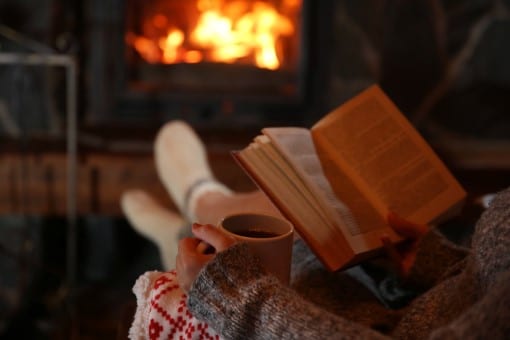
1) Make sure you’re relaxed before bedtime
If you’re super stressed before you even put on your mask, that’s going to make it even harder to get used to CPAP. Also, stress and anxiety makes it harder to fall asleep and can feed into panic attacks.
That makes it important to do whatever you can to be relaxed as possible at bedtime.
Your options include:
-Having a relaxing pre-bedtime routine to help you unwind
-Having a peaceful and comfortable sleep environment
-Stress management to reduce overall stress in life
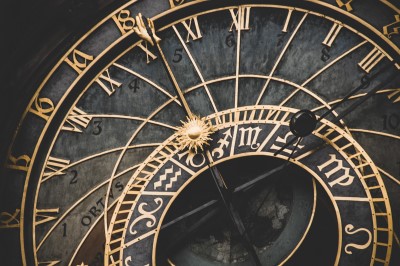
2) Give yourself some time to get use to things
Since wearing a mask is a totally new sleep experience, it’s important to allow yourself some time to get used to it:
-practice wearing your mask for brief periods while watching TV
-turn on your CPAP & practice feeling how your body reacts to the air pressure
-try it for shorter periods when first starting out
-wear the mask for a couple hours then a little longer each night
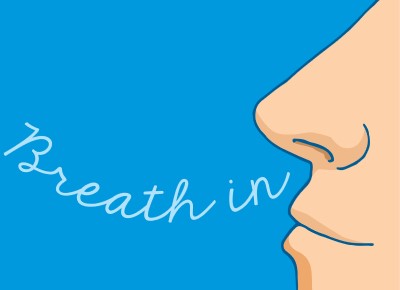
3) Try breathing Exercises
Another thing that can help with CPAP panic attacks is to practice breathing with your mask on.
Start by slowly inhaling for 4 seconds than exhale for 4 seconds. Count to 10 and focus on breathing if you start to feel panicky.
When your body realizes it can still breathe through the mask, it will not instinctively tense up.
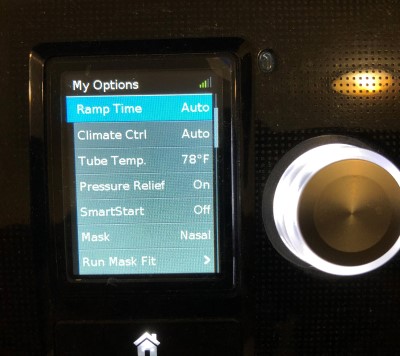
4) Adjusting your machine settings
It’s not uncommon that tweaks are needed to the CPAP settings for comfort and better sleep apnea control.
Some things you can adjust:
Air pressure – if it’s too low or high, you may feel like you’re not getting enough air or get overwhelmed by the air flow. You need it to be just right for you.
Ramp mode – This feature starts out at a lower pressure setting and gradually increases over time to the pressure proscribed by your doctor. Some people find the lower setting allows them to fall more easily asleep. For others, the feature is not useful because it makes feel claustrophobic because they fear there’s not enough air.
Your doctor and sleep technician can help you try out different machine settings.
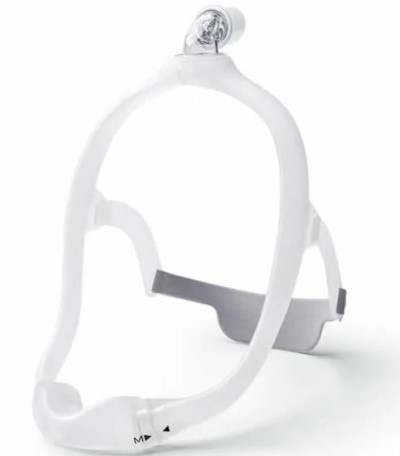
5) Try a different mask
Having the right mask can make a big difference.
Full face masks may block your field of vision and for some people it feels claustrophobic. Research studies have found that a poor fitting mask is the main cause for CPAP claustrophobia.
For some, the mask is just too uncomfortable and restrictive.
There are now leaner masks available including the smaller full-face AirFit F30 mask and nasal pillow masks. The nasal mask are designed for claustrophobic patients and just cover your nose.
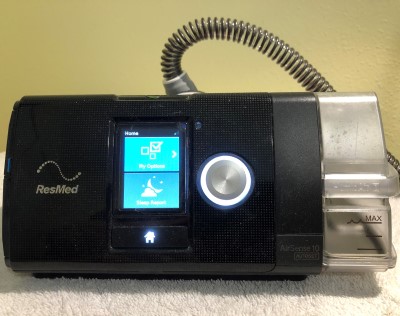
6) Try a different CPAP machine
There are three types of air pressure machines used to treat sleep apnea:
Continuous Positive Airway Pressure (CPAP) is the most basic and common type. It provides one steady level of pressure to the airway during sleep
Bilevel positive airway pressure (BiPAP) provides two levels of pressure during sleep. A higher pressure during inhalation and lower pressure during exhalation.
Some people find having separate pressure settings easier to exhale against. BiPAP machines may also be helpful for individuals with high pressure settings or low oxygen levels, cardiopulmonary disorders, or lung disorders.
Automatic positive airway pressure (APAP) machines auto adjusts the pressure during sleep based on your particular needs at any moment. They are able to sense changes in your breathing and adjust to a better pressure setting.
Depending on what machine your currently have, it’s worth asking your doctor if a different type might help with your panic attacks.

7) Natural stress and anxiety remedies
There’s a wide variety of natural supplements that may help you feel more relaxed so you’re not as stressed and anxious when you hook up to your CPAP machine. Some have been more tested than others and some are beneficial when combined with other ingredients.
Chamomile, valerian root, lavender:
Chamomile and valerian root extracts have been shown in studies to help with anxiety and promote relaxation. Likewise, aromatherapy with lavender essential oils has been shown to help.
Before trying these out, it’s worth checking with a complementary health specialist (naturopathic physician, herbalist) to see what makes the most sense for you.
CBD:
There’s also CBD (cannabidiol), a non-psychoactive chemical found naturally in marijuana. Unlike THC, it doesn’t give you a high.
CBD has become a popular remedy for anxiety. While more research is needed, studies have found it to be beneficial for some patients.
Learn more:
15 Natural sleeping aids
7 Best supplements that may help reduce stress (Everydayhealth.com)
Using CBD Oil for Treating Anxiety (VerywellHealth.com)
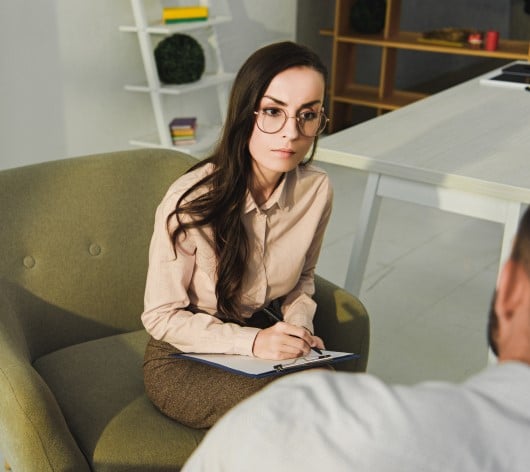
8) Counseling
A type of counseling known as cognitive behavioral therapy (CBT) can teach you different ways of thinking, behaving, and reacting to the feelings that come with a panic attack. It’s become one of the most effective treatments for insomnia.
The evidence is growing it can help sleep apnea patients too. In a recent study involving 145 people, patients were enrolled in sleep counseling before starting CPAP.
The patients who received counseling had fewer awakenings and were more likely to stick it out with their CPAP treatment.
Learn more:
Sleep counseling for sleep apnea
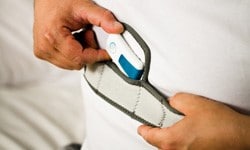
9) Try a different sleep apnea treatment
If you’ve tried everything you and your doctor can think of, don’t give up! While CPAP is one of the most effective treatments, it’s not the only game in town.
The latest sleep apnea treatments include new oral devices, body positioners, innovative nerve stimulators, and surgically implanted suspension lines.
With all of these options, you can still get your sleep apnea under control and get your life back.
Learn more:
The latest CPAP alternatives
Other things to help with anxiety and CPAP panic attacks
If you find that your CPAP panic attack symptoms are pretty serious, you may be dealing with something more serious like panic disorder, especially if it’s happening at other times besides at night.
Keep in mind you’re not the only one as anxiety disorders affect 40 million adults in the US alone. Unfortunately, only a third of people suffering receive treatment according to the Anxiety and Depression Association of America.
Regardless of how serious your panic attacks are, keep in mind that anxiety is treatable.
We’ve already mentioned psychotherapy counseling.
Some of the other things that can help include:
Lifestyle changes – Avoid substances such as alcohol, caffeine, and chemical substances and/or habituated behaviors that can trigger or worsen panic anxiety.
Exercise – Light to moderate aerobic exercise has been shown to help with anxiety. Learn more
Relaxation exercises – Deep breathing, mindfulness meditation, and muscle relaxation techniques have been used to help with panic attacks
Healthy nutrition
We are learning more about the connection between food, mood, and anxiety. Anti-anxiety nutrition therapy is growing in popularity as a way to manage anxiety.
They focus on avoiding processed foods containing simple carbs and eating a balanced diet rich with nutrients. Learn more
Natural remedies – Herbal supplements that contain kava have been found to be helpful for some people with mild to moderate panic disorder. Learn more
Medications – They’re many different types of medications used to treat anxiety disorders: selective serotonin reuptake inhibitors (SSRIs), serotonin-norepinephrine reuptake inhibitors (SNRIs), beta-blockers, and benzodiazepines. Be sure to talk with your doctor about possible side effects. Learn more
CPAP panic attacks and sleep apnea may not be your only sleep issues
Unfortunately, there’s a long list of things that can cause problems for sleep. Since your nights are already tough enough dealing with sleep apnea and CPAP panic attacks, why make things even harder?
This makes it important to practice good sleep hygiene, the everyday habits that set the stage for deep restful sleep. Poor sleep hygiene can sabotage everything else you do for your sleep.
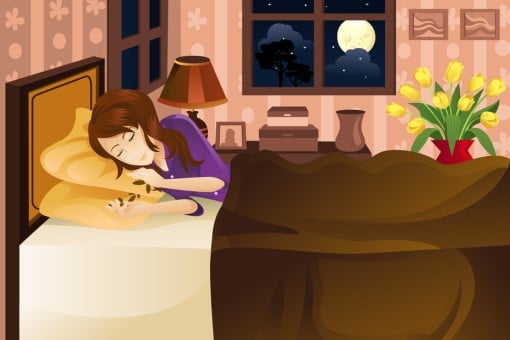
For better sleep hygiene, sleep experts suggest you:
- wake up and go to bed at the same time every day
- exercise
- avoid large meals, alcohol, and stimulants such as caffeine before bedtime
- maintain a bedtime routine
- avoid electronics (TVs, tablets, smartphones) near bedtime since the bright screens and engaging content can keep you up past bedtime
- keep your bedroom dark, cool, quiet, & relaxing
It’s also important to see a doctor, especially if your insomnia becomes a long-term problem.
Too many people aren’t aware how many other medical issues can cause problems or worsen sleep. This includes things like chronic pain, heartburn, cancer, dementia, and asthma.
You may also be interested in:
Sources:
1. Trends in CPAP adherence over twenty years of data collection: a flattened curve, J Otolaryngol Head Neck Surg. 2016; 45: 43.
2. Interventions for the Treatment of Obstructive Sleep Apnea in Adults: A Health Technology Assessment [Internet]. CADTH Optimal Use Report, No. 6.1b.
3. “Dealing with cpap claustrophobia & panic attacks”, Sleep Apnoea Trust Association
4. Sleep Apnea and Risk of Panic Disorder, Ann Fam Med. 2015 Jul; 13(4): 325–330.
5. Cognitive and behavioral therapy for insomnia increases the use of continuous positive airway pressure therapy in obstructive sleep apnea participants with comorbid insomnia: a randomized clinical trial. Sleep. 2019 Dec 24;42(12):zsz178.
6. “Facts & Statistics”, ADAA website
Connect with us:
About Us
Better Sleep Simplified® was founded as a place for you to get clear and well-researched information.
Our goal is to make sure you know about your options so that you take action sooner rather than later.
Check us out on YouTube:
Watch and Learn
Helpful sleep tips, interesting sleep facts and statistics you want to know about
Affiliate Disclosure
This site is a participant in the Amazon Services LLC Associates Program and other affiliate advertising programs designed to provide a means for sites to earn advertising fees by advertising and linking to them.
Important: BetterSleepSimplified.com is for informational purposes only and is not intended or implied to be a substitute for professional medical advice, diagnosis, or treatment. Always consult a physician for sleep and health concerns. See additional information.

